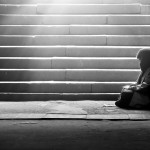
The relationship between homelessness, mental health, substance misuse and social exclusion is explored in this new report from the Joseph Rowntree Foundation. The short report, which features contributions from projects in the Multiple Exclusion Homelessness Research Programme, highlights how policy and practice can make a difference in this area.
Key points from the report include:
- There is a strong overlap between experiences of more extreme forms of homelessness and other support needs, with nearly half of service users reporting experience of institutional care, substance misuse, and street activities (such as begging), as well as homelessness.
- ‘Visible’ forms of homelessness – including the use of services like hostels or applying to the council as homeless – commonly happen after contact with non-housing agencies, for example mental health services, drug agencies, the criminal justice system and social services. They also occur after periods of ‘invisible’ homelessness such as sofa-surfing.
- Traumatic childhood experiences such as abuse, neglect and homelessness are part of most street homeless people’s life histories. In adulthood, the incidence of self-harm and suicide attempts is notable.
- Most complex needs were experienced by homeless men aged between 20 and 49, and especially by those in their 30s.
- Where homelessness and housing support agencies take on primary responsibility for supporting people with multiple and complex needs, workers can often feel isolated and out of their depth. It has been suggested elsewhere that housing support workers are now filling the gap left by the retreat of social workers from direct work with adults.
- People with complex needs are at serious risk of falling through the cracks in service provision. There needs to be an integrated response across health, housing and social care.
The report concludes:
Evidence from the Multiple Exclusion Homelessness Research Programme strongly supports the argument that there is a very high degree of intersection between homelessness and other complex social issues. Some people, especially those with very complex and multiple needs, do not fit neatly into existing service compartments. A shift is needed to focus on outcomes for the whole person rather than designing services and responses around client groups.
McDonagh, T. Tackling homelessness and exclusion: Understanding complex lives (PDF). Joseph Rowntree Foundation, September 2011.

There’s a blog by Kathleen Kelly, Policy and Research Manager at the Joseph Rowntree Foundation to accompany this report: http://www.jrf.org.uk/blog/2011/09/should-we-be-tackling-homelessness